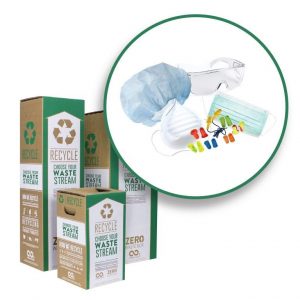How Does Increased PPE Use Affect the Environment?
By: Emily Bernard, Bethesda Green Be Green Living Intern
The Covid-19 pandemic has dramatically changed many aspects of our daily lives. Most of us adapted to a new normal of social distancing and working from home. At the beginning of the worldwide lockdown, people noticed how the natural environment was responding to the significant decrease in human activity as most countries went into quarantine. There were reports of clear waterways and cleaner air in cities that typically struggled with pollution. In Maryland, the Department of the Environment reported in mid-April that based on traffic and satellite data, greenhouse gas emissions and air pollution decreased due to the lack of commuter traffic and power plant production.
However, as the pandemic continues, concern is growing over the unsustainable use and disposal of single-use personal protective equipment (PPE) by both frontline hospital workers and the general public.
During the early stages of the pandemic PPE became a hot button topic due to the worldwide shortage of supplies for hospital workers as the virus spread. At this point in time New York City hospital workers were reporting wildly scarce resources, and some were sharing their stories of using whatever materials they could find, even trash bags, as PPE. In Maryland, Governor Hogan issued a state grant to Maryland based companies manufacturing PPE after hospitals reported dwindling supplies of the much needed resource. This announcement came at a time when not only were states competing against each other for federal supplies of PPE, but the US was bidding against other nations for PPE supplies. In late April, the president of the Maryland Hospital Association, Bob Atlas, reported that Maryland hospitals were at about 80% capacity and that the state hospitals’ PPE supply was running short, so the production of PPE in the state would help distribute supplies where they were needed.
Although the proper use and disposal of PPE is necessary, it is important to understand the environmental ramifications of single-use PPE. Because of the potential for infection through contact, all hospital PPE has to be treated as hazardous or infectious waste and disposed of in specific ways. Hazardous waste is either incinerated or sent to specific landfills. The environmental effects of incineration include increased carbon dioxide emissions, possible release of toxins, production of harmful ash, and unhealthy air quality.
In Maryland, there are more than 100,000 hospital workers who must be protected everyday by disposable PPE. The amount of single-use PPE waste from that sector alone is alarming, especially when you consider that those materials are required to be incinerated. These frontline workers absolutely need to be protected from possible infection, but the option for reusable or multiple use PPE such as cloth masks and gowns could help to reduce the negative environmental effects of hazardous waste. An article from Johns Hopkins on the different types of masks, stresses the point that hospital workers are best protected by N95 respirator masks, but second to those are cloth masks. The article describes how disposable masks, also called surgical masks, are loose fitting and only protect against large droplets, making cloth masks more effective against small virus droplets. However, the problem extends beyond waste from hospitals only to the general public as well.
Beginning in April, everyone in Maryland was required to wear a facemask in public spaces, including in the grocery store or on any type of public transportation. As Maryland moved into Phase 2 of reopening, face covering requirements were extended to most retail and service businesses. Though the executive order is necessary for mitigating the spread of COVID-19 through air droplets, it also creates a waste issue. Most of the public are wearing the single-use masks that are more readily available than the cloth masks. However, the single-use masks are often improperly disposed of and even being tossed on the ground, causing PPE to end up in local waterways and sewer drains. When trash washes into local streams and rivers, it has adverse effects on wildlife, including the possibility of choking and trapping certain animals, or causing toxins to be introduced into their digestive systems.
 So, when you are out and about please wear your mask, but also think of how to dispose of your PPE in an environmentally friendly manner. Perhaps invest in a cloth mask that can be washed between wears and reused many times. Or keep an eye out for TerraCycle Zero Waste boxes, that collect PPE including masks, gloves, and safety glasses for cleaning and repurposing.
So, when you are out and about please wear your mask, but also think of how to dispose of your PPE in an environmentally friendly manner. Perhaps invest in a cloth mask that can be washed between wears and reused many times. Or keep an eye out for TerraCycle Zero Waste boxes, that collect PPE including masks, gloves, and safety glasses for cleaning and repurposing.
References
Fletcher, Carly. “How is Used PPE Disposed of During the Coronavirus Pandemic.” Global BioDefense,https://globalbiodefense.com/2020/05/12/how-is-used-ppe-disposed-of-during-the-coronavirus-pandemic/.
“Fostering a Robust, Engaged Health Care Workforce.” Maryland Hospital Association, https://www.mhaonline.org/transforming-health-care/workforce.
“Governor Hogan Announces $1.6 Million In Grants To Maryland Companies Producing PPE In Response To COVID-19” Maryland.gov, https://governor.maryland.gov/2020/04/28/governor-hogan-announces-1-6-million-in-grants-to-maryland-companies-producing-ppe-in-response-to-covid-19/.
“Keep the Planet Safe and Recycle PPE Waste with Terracycle.” Waste Advantage Magazine, https://wasteadvantagemag.com/keep-the-planet-safe-and-recycle-ppe-waste-with-terracycle/.
Kurtz, Josh. “Early Analysis Shows Md. Air Quality Improving During Pandemic.” Maryland Matters,https://www.marylandmatters.org/blog/early-analysis-shows-md-air-quality-improving-during-pandemic/.
Leonard, George. “What We Know—and Don’t Know—about Plastics and the Coronavirus Pandemic.” Ocean Conservancy, https://oceanconservancy.org/blog/2020/04/16/know-dont-know-plastics-coronavirus-pandemic/.
Maragakis, Lisa. “Coronavirus Face Masks: Types and Protection FAQs.” Johns Hopkins Medicine, https://www.hopkinsmedicine.org/health/conditions-and-diseases/coronavirus/coronavirus-face-masks-what-you-need-to-know.
Miller, Hallie. “Mask Mandates in Maryland: Where You Need to Wear One and What You Need to Know.” The Baltimore Sun, https://www.baltimoresun.com/coronavirus/bs-md-guide-to-mask-wearing-in-baltimore-20200723-afma2rwegnejbbpmamhw4k7ade-story.html.
“Negative Impacts of Incineration-Based Waste-To-Energy Technology.” Alternative Energy News, https://www.alternative-energy-news.info/negative-impacts-waste-to-energy/.





